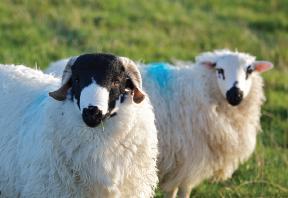Farming
‘Perfect storm’ hits lamb prices


Lacklustre trade drives down prime prices.
THERE are many factors contributing to the depressed lamb price seen in recent weeks, says the National Sheep Association (NSA), meaning a change to any of these could see some relief for the sheep sector as its heads towards peak production.
Phil Stocker, NSA Chief Executive, says: “There are several factors contributing to the current situation: The strength of the pound; the economic situation on the continent; an increased New Zealand offering on our supermarket shelves; farmers in some regions lambing earlier in 2015, assisted by dry weather allowing them to sell new season lamb sooner; and a larger carry-over of old season lambs from 2014. While this has created an unfortunate ‘perfect storm’ to push the lamb price down, it also means that the sheep sector should not lose heart, as it would only take one or two factors to change for there to be an uplift in the price.”
Looking at the number of old season lambs (hoggs) still to come forward when many lamb producers are gearing up to supply new season lambs, NSA urges farmers not to hang onto last year’s stock unnecessarily.
He says: “NSA encourages producers to get old season lambs fit and into the food chain as soon as they are ready and meet market specifications. This will make way for new season stock coming through, as although the price for these is disappointing, it is being held back further by the carry-over of hoggs. We understand that too many overweight old season lambs have been coming through (48kg+), which undoubtedly depresses the market, so the message for the sheep sector is to get lambs fit (not fat) and get them away.”
The lacklustre trade is hard for lamb producers to swallow when the price 12 months ago was particularly good, but the strong trade last year is presumably fresh in the mind of supermarket buyers as indicators point towards them stocking up with cheaper New Zealand lamb to off-set demand for UK product.
Mr Stocker continues: “We know that plenty of New Zealand lamb is available at the moment, as the drought there is causing lambs to be sold earlier than usual, but this will not last and is not appropriate for UK retailers at a time of year when domestic production is gearing up. NSA believes it is short-sighted for supermarkets to try and avoid paying for premium UK product, as in the long-term it threatens the viability of sheep farms and the future supply of domestic product.
Supermarkets have a responsibility to stock and promote UK lamb, or risk irreversibly damaging their supply base. This is an incredibly frustrating time for sheep farmers, but the sector should remain positive as the factors currently combining to depress trade are not permanent in nature. Some of these factors are outside all of our control but others, such as stimulating demand by increasing export market, is something the sector is working on. And one thing that is always within farmers’ control is on-farm efficiencies. Producing lamb in as cost-effective a manner as possible is crucial, regardless of what happens beyond the farm gate.”
Business
Farmers cautious but resilient as costs remain high across Wales

Major supplier says confidence lower despite signs of stability returning
FARMERS across Wales are facing another difficult year as input costs remain significantly higher than before the pandemic, according to new industry insight from agricultural supplier Wynnstay Group.
The company, which has deep roots in rural Wales and generates around sixty per cent of its retail revenue in the country, says confidence among farmers is lower than this time last year, with rising costs, policy uncertainty and tightening margins influencing spending decisions.
However, there are also signs of resilience, with many producers focusing on efficiency and forward planning to cope with ongoing pressures.

Wales at heart of business
Wynnstay, originally founded by tenant farmers in Mid Wales in 1918, has grown into a major UK agricultural supplier serving more than 20,000 farming customers through manufacturing sites, stores and on-farm services. The group employs hundreds of staff across the UK and operates a nationwide distribution network supporting livestock and arable producers.
The company says Welsh farming businesses continue to play a central role in its commercial performance and long-term growth strategy.
Cautious investment decisions
According to Wynnstay, farmers are delaying some investment decisions but are increasingly seeking value-driven solutions that improve productivity.
Feed volumes have increased across the company’s Welsh store network over the past year, reflecting demand for blended feeds that offer greater flexibility and cost control. Rather than reducing purchases outright, many farmers are matching spending more closely to performance and output.
Fertiliser demand has also been strong, with sales ahead of last year, although some farmers have delayed buying in the hope prices may fall. Global supply pressures and rising gas costs mean prices are expected to remain firm into the busy spring season.

Costs still far above pre-Covid levels
Industry data shows overall farm input costs remain significantly higher than before 2020, with feed, fertiliser, fuel, electricity and machinery all continuing to put pressure on farm margins.
While some costs have eased from their peaks, they have not returned to previous levels, influencing buying behaviour across the sector.
Margins for livestock and dairy farms were strong last year, but Wynnstay says they are now tightening, particularly in the dairy sector where milk prices have fallen and volatility remains high.

Pressure on family farms
Smaller family-run farms are under greater strain than larger commercial operations, with less financial resilience to absorb rapid market changes. Reports of rising closures among family farms, particularly in dairy, reinforce concerns about the sector’s long-term sustainability.
Government policy changes are also contributing to uncertainty. The transition away from the Basic Payment Scheme and wider tax reforms have led many farmers to postpone larger investments until there is clearer long-term stability.

Local reaction
Pembrokeshire farmer Chris James said the situation reflected what many farmers were experiencing locally.
“We’ve definitely noticed the squeeze over the past year or two,” he said. “Costs for feed, fertiliser and fuel are still much higher than they used to be, and that makes you think twice about every decision. Most farmers I know aren’t cutting back on production — they’re just trying to be more efficient and careful with spending.”
He added: “People want to invest and move forward, but it’s hard when you don’t know exactly what the long-term policy picture will look like.”
NFU Cymru has also warned that rising costs and policy uncertainty continue to weigh heavily on farm businesses across Wales, with confidence affected by concerns over future support schemes and wider economic challenges. The union has called for greater long-term certainty to allow farmers to invest with confidence and maintain domestic food production.

Weather shocks impact behaviour
Extreme weather during 2025 — including a very dry spring followed by periods of intense heat and a challenging wet autumn — also affected purchasing patterns, with farmers spacing orders and prioritising essential inputs as conditions changed.
Ordering behaviour is now returning to more normal patterns as conditions stabilise.
Outlook for 2026
Despite ongoing pressures, Wynnstay says it is cautiously optimistic about the year ahead.
Many farmers are making careful decisions around efficiency, nutrition and planning, and the company believes there are opportunities for businesses to strengthen their position through 2026 with good cost control and smart investment.
Summing up the sector, the company said Welsh agriculture remains resilient, with farmers showing determination and adaptability despite continuing challenges.
Farming
Growing fodder beet could be attractive option after difficult 2025 forage season

AFTER the lack of forage in many areas in 2025 due to the drought, this season could see increased interest in growing fodder beet on livestock farms, believes ProCam agronomist, Nick Duggan.
Once fodder beet gets its roots down, it can be quite drought tolerant, says Nick, so it could appeal to farmers looking to diversify forage crops to mitigate risk.
“Although inputs can be quite high, fodder beet does offer a big crop of energy,” explains Nick, who operates in Herefordshire, South Shropshire, Powys and the Cotswolds.
“Compared with stubble turnips yielding about 4-6t of dry matter/ha (DM/ha), fodder beet might yield 20t DM/ha. And, at around 12.5ME, the energy content of its roots is similar to grass.
“There’s also the flexibility to feed fodder beet to sheep, beef or dairy, and to lift or graze it, although it’s important to ‘wean’ livestock onto it gradually, especially cattle, because its high energy content can cause acidosis,” he adds.
To help ensure that farmers grow the right varieties for their situation based on robust data, Nick says ProCam has been evaluating the performance of fodder beet varieties over multiple seasons, with on-farm trials conducted in the North and West of the country as well as other locations country wide.
“We test a range of varieties,” he continues. “These range from low DM beets for grazing, to high energy types for lifting and chopping for livestock, or for use in anaerobic digestion (AD) plants.
“Typically, 20 or so varieties might be tested annually in these replicated trial plots, with 4-5 new varieties included each year. But a lot of the established varieties have been in the trial for maybe six years – so we have long term data and can robustly benchmark new varieties.”
Assessments begin with variety emergence and vigour, and conclude at harvest by measuring yields, says Nick, with beets lifted and tops and roots weighed separately. Yields per hectare are then calculated, corrected for %DM.
“Also at harvest, each variety is assessed for disease resilience, and for the amount of root protruding above the soil. More root protruding is helpful if grazing. If lifting beet, you want more root in the ground for protection from frost.
“Agronomically, we encourage all farmers to keep the tops as healthy as possible with a summer nutrition programme. As well as helping to protect roots from frost, a healthy canopy helps sustain the crop into winter. This helps if growing for energy for AD plants, but also tops have good feed value, at about 17% crude protein, and can provide 2-2.5t DM/ha.”
In addition to evaluating varieties, ProCam also evaluates the performance of primed seed, says Nick, which is available with certain fodder beet varieties. Primed seed is pre-germinated for faster emergence, and tends to produce more uniform plants at the cotyledon stage, he notes.
“Faster establishment, in turn, helps with weed suppression, and once fodder beet reaches 12 leaves, it becomes more tolerant to virus yellows.
“Plus, primed seed can deliver higher yields. Results can vary, but in five years of trials on the variety Geronimo we saw a yield uplift of approximately 1.5t DM/ha from Active Boost primed seed compared with conventional seed.
“With the unpredictable spring weather we get nowadays, I think primed seed is extremely useful technology for fodder beet growers.”
Photo caption: Fodder beet offers a big crop of energy, and once it gets its roots down it can be quite drought tolerant, says ProCam agronomist, Nick Duggan
Farming
Deputy First Minister raises concerns over fishing funds and farm policy

Funding formula and visa rules among key issues discussed ahead of Senedd election period
THE WELSH Government has voiced concerns over fishing funding allocations, farm policy, and potential labour shortages during a recent UK-wide ministerial meeting on rural affairs.
Deputy First Minister and Cabinet Secretary for Climate Change and Rural Affairs, Huw Irranca-Davies, attended the latest Inter-Ministerial Group for Environment, Food and Rural Affairs meeting on Wednesday (Feb 5), alongside ministers from the UK, Scottish and Northern Ireland governments.
One of the main topics was the UK Fishing and Coastal Growth Fund. Ministers from devolved administrations expressed disappointment that the Barnett formula had been used to determine allocations, arguing it failed to reflect the size and importance of the fishing sector in each nation or previous funding levels.
Talks also covered progress on negotiations for a UK-EU sanitary and phytosanitary (SPS) agreement, which could affect cross-border trade in food, plants and animals. Devolved governments welcomed engagement from the UK Government so far but stressed the need for continued cooperation, particularly around biosecurity and the legislative process required to implement any agreement across the UK.
Ministers also discussed the UK Government’s Farm Profitability Review — known as the Batters Review — and the emerging UK Food Strategy. Although these policies apply mainly to England, ministers noted they could still have implications for Wales and other devolved nations, highlighting the need for collaborative working.
A joint approach to banning peat use in horticulture was also agreed in principle, with the Department for Environment, Food and Rural Affairs (Defra) expected to set out possible timelines.
Concerns were also raised about proposed changes to UK work visa rules, which ministers warned could worsen shortages of seasonal agricultural workers, particularly sheep shearers. UK Government ministers acknowledged the risks and said discussions were ongoing.
The next meeting of the Inter-Ministerial Group is scheduled for March 2026, ahead of the upcoming elections in both Wales and Scotland.
-

 Health6 days ago
Health6 days agoWithybush loses emergency surgery in shock health board decision
-

 Health5 days ago
Health5 days agoHealth board confirms major hospital changes across west Wales
-

 Health4 days ago
Health4 days agoConcerns grow over Bronglais stroke plans as politicians demand clarity
-

 Health5 days ago
Health5 days agoHealth board: Changes will bring “resilience and sustainability” to West Wales services
-

 Local Government3 days ago
Local Government3 days agoCandidate who withdrew from Hakin race will still appear on ballot paper
-

 Business6 days ago
Business6 days agoMounting complaints: More Computer Solutions Wales customers claim losses
-

 Crime7 days ago
Crime7 days agoSexual assault allegation to be tried
-

 Local Government3 days ago
Local Government3 days agoFirst Minister left red-faced as Labour candidate pulls out during Hakin campaign visit




























